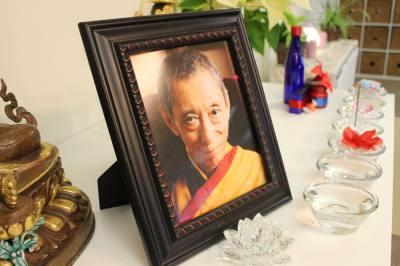As resident teacher at the Montrose-based Kadampa Meditation Center Houston, Gen Wangpo said he teaches the Modern Kadampa Buddhism tradition, which focuses on incorporating Buddhism into daily life. "Gen" is an honorific signifier for those who have been teaching for more than four years.
He said the founder of this tradition, Venerable Geshe Kelsang Gyatso Rinpoche, encouraged its teachers to meet people where they are.
Although some of the people who go to the center may desire to become Buddhist, many more just want to be happy, Gen Wangpo said.
“‘We can teach them how to be happy,’” he said, referencing the founder’s teachings. “‘They do not need to be a Buddhist to learn the methods for happiness. Please help everyone be happy. Please help everyone solve their problems, solve their painful and unpleasant feelings.’ ... I always found that to be ... an expression of love.”
Although it's a young center, having just opened in January 2020, Gen Wangpo said his focus is on the future and the influence these teachings could have on the millions of people across Houston.
He compares this work to planting seeds that will grow into trees and eventually become a forest, with its own ecosystem and wildlife.
“When you see a little seedling sprout, you don't picture the forest and the birds and the wildlife and everything that comes with it, and especially you don't picture the subtle things, like how a forest affects ecology and weather,” he said. “Just a few seeds can literally transform an entire environment. The same is true of human potential.”

Gen Wangpo describes Kadampa as a modern form of Buddhism, with “modern” replacing the country as a cultural reference for the spiritual practice.
“So anybody who's living a modern lifestyle may find that these teachings fit culturally with where they're at, in their own homes, their cities, their countries,” he said. “So the idea of Kadampa Buddhism we could say, we want to unify the teachings and the spiritual aspects of Buddhism with our daily life.”
The nonprofit center is part of the larger New Kadampa Tradition, an international Buddhist community with over 1,200 centers and groups around the world.
But a visitor doesn’t have to be Buddhist to visit the center, Gen Wangpo said.
“Our biggest emphasis is helping people learn how to meditate so that they can have their personal journey,” he said. “We also have more in-depth study classes that really allow us to not only become familiar with the [Buddhist] teachings, but their meanings on deeper levels, and we have the opportunity to discuss how we practice them.”

Classes at the meditation center are held Sunday mornings, and Monday and Thursday nights, and fluctuate between 12-20 attendees per session.
The space also has a small bookstore and a space at the entrance to sit and engage with other visitors.
Gen Wangpo hosts workshops all around Houston and has classes in The Woodlands. He said the community is reflective of the city, with people coming from every direction and even from beyond the city.
“I've had folks come up from NASA, Richmond, Katy, Tomball,” he said. “People will definitely make the trip in for these classes and workshops.”
Gen Wangpo said he wants to reach as many Houstonians as possible and aims to develop senior students who can connect with Spanish speakers.
“One of our goals is not only to have more teachers teaching, but also to have people who connect with different regions or neighborhoods in the city that allows a greater level of comfort,” he said.
Additionally, the center offers prayer services and workshops. Classes cost $12, and weekends are typically $20 for a three-hour workshop.
- 1110 Lovett Blvd., Houston
- www.meditationinhouston.org






